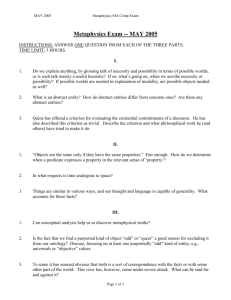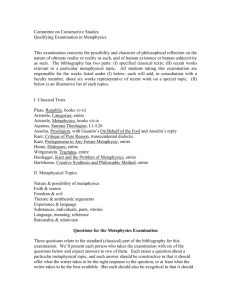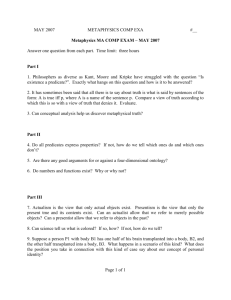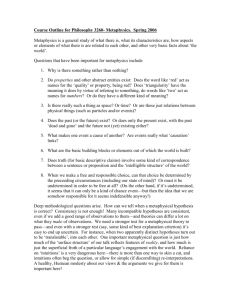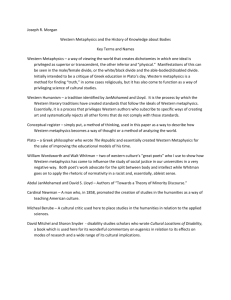Phil 20C / Holden / Spring 2005 / lecture 26
advertisement
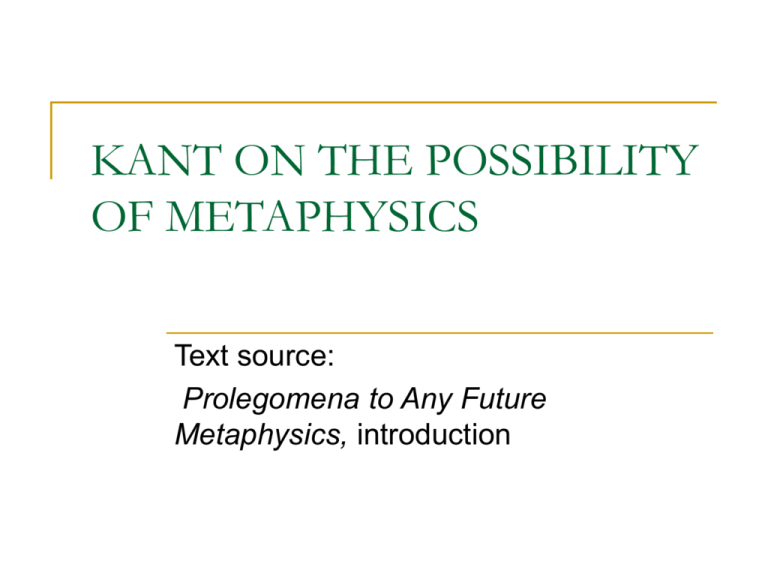
KANT ON THE POSSIBILITY OF METAPHYSICS Text source: Prolegomena to Any Future Metaphysics, introduction KANT’S CHALLENGE: IS METAPHYSICS POSSIBLE AT ALL? “My purpose is to persuade all those who think metaphysics worth studying that it is absolutely necessary to pause a moment and, regarding all that has been done as undone, to propose first the preliminary question: ‘Whether such a thing as metaphysics be even possible at all?’” (p.532) “I venture to predict, that the independent reader of these Prolegomena will not only doubt his previous [metaphysics], but ultimately be fully persuaded that it cannot exist unless the demands here stated on which its possibility depends be satisfied; and, as this has never been done, that there is, as yet, no such thing as metaphysics.” (p.533) WHAT DOES KANT MEAN BY ‘METAPHYSICS’? METAPHYSICS (for Kant) involves the extension of human knowledge beyond those facts we know via experience. Unlike empirical knowledge, which trades in contingent truths (truths that could have been otherwise), it involves knowledge of necessary truths. Metaphysical topics include (i) the being and nature of God, (ii) the possibility and actuality of human freedom, (iii) the immortality of the soul, (iv) the ultimate nature of space and time, (v) the nature of causation and substance. HUME’S WAKE-UP CALL: “I openly confess my recollection of David Hume was the very thing which many years ago first interrupted my dogmatic slumber and gave my investigations in the field of speculative philosophy a new direction.” (555) “Since the Essays of Locke and Leibniz, or rather since the origins of metaphysics so far as we know its history, nothing has ever happened which could have been more decisive to its fate than the attack made upon it by David Hume.” (533) HUME’S CHALLENGE TO METAPHYSICAL KNOWLEDGE OF CAUSATION “Hume started chiefly from a single but important concept in metaphysics, namely, that of the connection of cause and effect. … He challenged reason, which pretends to have given birth to this concept herself, to answer him by what right she thinks anything could be so constituted that if the thing be posited, something else must necessarily be posited; for this is the meaning of the concept of cause. He demonstrated irrefutably that it was perfectly impossible for reason to think a priori and by means of concepts such a combination, for it implies necessity. We cannot at all see why, in consequence of the existence of one thing, another must necessarily exist or how the concept of such a combination can arise a priori. Hence he inferred that reason was altogether deluded with reference to this concept, which she erroneously considered as one of her own children, whereas in reality it was nothing but a bastard of the imagination, impregnated by experience, which … mistook a subjective necessity (habit) for an objective necessity arising from insight.” (533) KANT: HUME’S CHALLENGE CAN BE GENERALIZED TO ALL METAPHYSICAL CONCEPTS “[Hume] inferred that reason had no power to think such combinations [where one event necessarily entails another], even in general, because her concepts would then be purely fictitious and all her pretended a priori cognitions nothing but common experiences marked with a false stamp. In plain language, this means that there is not and cannot be be any such thing as metaphysics at all.” (533-4) “I therefore first tried whether Hume’s objection could not be put into a general form, and soon found that the concept of the connection of cause and effect was by no means the only concept by which the understanding thinks the connection of things a priori, but rather that metaphysics consists altogether of such concepts.” (535)


